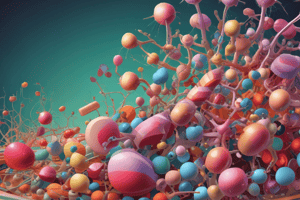Podcast
Questions and Answers
What enzyme in the kidney inactivates imipenem when given alone?
What enzyme in the kidney inactivates imipenem when given alone?
- Peptidoglycan polymerase
- Renal dihydropeptidase enzyme (correct)
- Plasmid-mediated enzyme
- Vancomycin receptor molecule
Which antibiotic is less likely to provoke seizures when compared to imipenem?
Which antibiotic is less likely to provoke seizures when compared to imipenem?
- Vancomycin
- Cilastatin
- Pseudomonas strains
- Meropenem (correct)
What is the mode of action of vancomycin?
What is the mode of action of vancomycin?
- Activates bacterial cell wall enzymes
- Inhibits synthesis of bacterial DNA
- Inhibits RNA transcription in bacteria
- Inhibits synthesis of bacterial cell wall phospholipids and peptidoglycan polymerization (correct)
Which antibiotic is effective against Methicillin-resistant Staphylococcus aureus (MRSA)?
Which antibiotic is effective against Methicillin-resistant Staphylococcus aureus (MRSA)?
What can cause resistance to vancomycin?
What can cause resistance to vancomycin?
What is the purpose of combining imipenem with cilastatin?
What is the purpose of combining imipenem with cilastatin?
What adverse effect is associated with high doses of imipenem?
What adverse effect is associated with high doses of imipenem?
How does meropenem differ from imipenem in terms of metabolism?
How does meropenem differ from imipenem in terms of metabolism?
What type of bacteria are vancomycin effective against?
What type of bacteria are vancomycin effective against?
Flashcards are hidden until you start studying
Study Notes
- Imipenem and meropenem are broad-spectrum antimicrobial drugs effective against most aerobic and anaerobic bacteria, except for some Pseudomonas strains.
- Imipenem is combined with cilastatin to prevent inactivation by the dihydropeptidase enzyme in the kidney and reduce renal toxicity, while meropenem does not undergo metabolism by this enzyme.
- Common adverse effects of these drugs include blood disorders and seizures in high doses, with meropenem being less likely to cause seizures. Gastrointestinal side effects like nausea and vomiting may also occur.
- Vancomycin is effective against multiple drug-resistant organisms like MRSA, working by inhibiting bacterial cell wall synthesis and damaging the cell membrane.
- Vancomycin is primarily used for serious MRSA infections in patients allergic to penicillins or cephalosporins, administered via slow IV infusion.
- Resistance to vancomycin can occur due to changes in drug permeability or decreased binding to receptor molecules.
- Penicillins like penicillin G have limitations such as acid lability, short half-life, narrow spectrum, and susceptibility to β-lactamase enzymes, requiring frequent injections and careful administration.
Studying That Suits You
Use AI to generate personalized quizzes and flashcards to suit your learning preferences.




